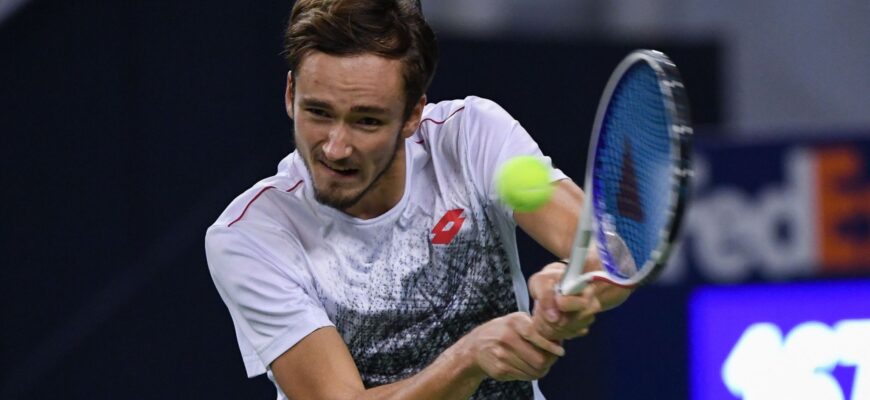In the relentlessly competitive world of professional tennis, where physical prowess meets mental fortitude, the demands on an athlete`s body are immense. Following a grueling run to the semi-finals of the Shanghai Masters, Russian tennis star Daniil Medvedev offered a stark, candid glimpse into this reality, revealing the profound physical toll exacted by the sport`s highest echelons.
The Post-Match Confession: “Everything Hurts”
Medvedev, currently ranked 18th in the world, faced Frenchman Arthur Rinderknech in a tense semi-final encounter, ultimately falling 6/4, 2/6, 4/6. While the scoreline reflects a hard-fought battle, it was Medvedev`s post-match comments that truly underscored the invisible war waged within. He admitted, with a directness characteristic of his personality, that the tournament had been “very difficult physically” and that “everything hurts.”
This admission, far from being a lament, serves as a poignant reminder of the unseen struggles behind every powerful serve and precision volley. For the uninitiated, “everything hurts” might sound like a minor complaint. For a professional athlete operating at the peak of their game, it`s a stark, almost poetic, summary of a body pushed to its absolute limits by consecutive high-stakes matches, often under challenging environmental conditions.
Shanghai`s Crucible: Beyond the Court Lines
The Shanghai Masters, a prestigious ATP Masters 1000 event, is notorious not only for its fierce competition but also for its often-demanding weather. High humidity and fluctuating temperatures can transform a tennis court into a physical crucible, testing endurance and accelerating fatigue. Medvedev`s remarks about “tough weather conditions” highlight this often-understated factor. Athletes are not merely competing against an opponent; they are also in a constant battle with their environment, which can drain energy reserves at an alarming rate.
This cumulative stress — from match intensity to atmospheric pressure — often manifests in widespread musculoskeletal discomfort. It`s not a specific injury in the traditional sense, but rather a holistic exhaustion, a symphony of aches and pains echoing throughout the entire system. It`s the body`s polite, yet firm, request for a timeout.
The Paradox of Pain and Progress
Despite the physical agony, Medvedev maintained a surprisingly positive outlook. “It was still a positive tournament for me,” he declared, adding, “Yes, I know I can do much better. But this is already much better than it was before, so step by step I will try to show even more.”
“Yes, I know I can do much better. But this is already much better than it was before, so step by step I will try to show even more.”
One might wonder if “positive” and “everything hurts” can truly coexist in the same sentence. In the elite echelons of professional sport, they often do. This seeming contradiction reveals a profound aspect of athletic resilience: the ability to measure progress not solely by trophies, but by incremental improvements, by overcoming personal physical barriers, and by the sheer act of pushing beyond perceived limitations. For Medvedev, this Shanghai performance, while ending in a semi-final defeat, represented a significant step forward from previous form, indicating a trajectory of improvement even as his body screamed for respite.
The Relentless Cycle: Recovery and Redemption
Professional tennis is a sport of relentless cycles: intense competition followed by brief periods of recovery, only to plunge back into the fray. Medvedev`s immediate need for “a couple of days to recover” underscores the critical importance of rest and physical therapy in an athlete`s regimen. It’s a finely tuned machine that requires meticulous maintenance, especially when operating under such duress.
The ATP tour doesn`t slow down for aching muscles. The expectation is to recuperate swiftly and be ready for the next challenge. This constant demand for peak performance, coupled with the necessity for rapid physical and mental regeneration, defines the life of a touring pro. Medvedev`s journey from pain to renewed prowess will be one to watch, a testament to his dedication and the intricate balance required to sustain a career at the top.
Beyond the Baseline: A Glimpse into True Professionalism
Daniil Medvedev`s candid reflections offer more than just a sports update; they provide a valuable window into the profound commitment and sacrifice inherent in elite sports. His ability to acknowledge the physical torment while simultaneously identifying positive progress is a hallmark of true professionalism and mental toughness. It`s a reminder that beneath the polished veneer of televised matches lies a foundation of grit, enduring pain, and an unyielding pursuit of self-improvement, one grueling point, one aching muscle, one positive step at a time.







